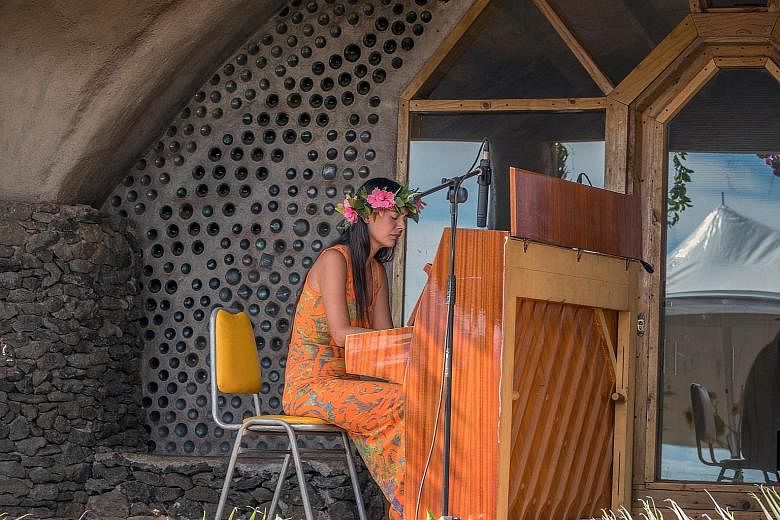From Rapa Nui, one of the remotest inhabited islands on the planet, pianist Mahani Teave went on to earn a place on the international concert stage.
But rather than press on with a career of incessant touring, as quite possibly the only professional classical performer to emerge from Rapa Nui to date, she decided to return and establish the first music school on the small island nearly a decade ago.
But the 38-year-old has not stopped playing.
Teave's debut album, Rapa Nui Odyssey, was recently released on the British label Rubicon Classics. The recording project inspired Song Of Rapa Nui, a new documentary streaming on Amazon Prime.
It was at Teave's island school that Seattle-based musician David Fulton had a chance encounter with her as part of a world cruise with his wife in spring 2018.
"After we had visited the moai" - the monolithic statues of revered ancestors that symbolise Rapa Nui - "we were taken to the school to hear a performance", he said.
"The kids had flowers in their hair and used the back porch of the school as a stage."
Then Teave began playing on a wobbly upright piano.
"It was so moving and unexpected, even surreal," Fulton said.
"She played a serious programme. I thought, 'This is not a good pianist, this is one of the world's greatest pianists.'"
He was shocked to discover that Teave had never released a recording. He invited her to Seattle to put down some of her favourite repertoire at Benaroya Hall, engaging Grammy Award-winning engineer Dmitriy Lipay, who works with the Seattle Symphony and the Los Angeles Philharmonic.
Lipay recalls that he was concerned about whether there would be sufficient studio time for the challenging programme Teave had conceived - Bach, Liszt, Handel, Scriabin, Chopin and Rachmaninov - with a musician who had never before recorded in the studio.
"With Mahani, we were in for a big surprise," he said. "The recording process with her was very similar to the golden years, when artistes were willing and able to give a complete performance in one take."
Teave's first exposure to the classical repertory came from an itinerant ballet teacher and, for years, her favourite work was The Nutcracker, which she listened to incessantly on a cassette, practising her steps at home.
"There were no classical radio stations on the island when I was a little girl," she said. "Nobody even knew about classical music, except for tidbits they might catch from some movie."
When a retired violinist later settled temporarily on the island, bringing along a piano, Teave became fascinated by the instrument and persuaded the woman to give her lessons.
Teave also wrote to Chilean pianist Roberto Bravo, pleading with him to visit Rapa Nui. He did, and invited her to make her public debut; she was nine.
On his advice, Teave's mother, an American who had settled on the island and married a native of Rapa Nui, took her daughter to Valdivia, in the south of Chile, to study at the conservatory.
She went on to teachers in Cleveland and Berlin, a city where she felt especially at home and which became her base for almost four years.
Her decision to return to Rapa Nui after launching a potentially stellar career was part of a slow process.
She felt she had devoted "the right amount of time" to each stage of her formation up to that point - "like a musical phrasing".
"A little door opened and I decided to go through it because nobody else will," she added. "I realised we need a school and I am the tool of this universe to do what has to be done at this moment."
With Enrique Icka, a construction engineer with a parallel career performing traditional music and who sings on one of the album's tracks, Teave founded a school for music and the arts.
They named it Toki, the Rapa Nui word for "tool" - the same word that denotes the objects used to carve the mysterious moai statues.
"It's a very symbolic word," she said, "because we believe the present carves the future."
Normally, about 100 students, from two-year-olds to teenagers, study each year, enrolled in classes in both traditional Polynesian and Western classical music that meet after regular school hours.
During the pandemic, the student body has dwindled to 60.
Rapa Nui has been especially hard hit because of its reliance on tourism - the chief engine, along with farming, of the island's economy.
But even before last year, a general lack of opportunities has led to high rates of alcoholism, drug abuse and domestic violence.
Teave said: "If the children want to be musicians, they get the possibility to study here and later continue off the island when they are old enough.
"But the others who will not pursue music as a career learn values that come just with learning an instrument. I see it as a tremendously necessary element, especially in a community which is as vulnerable as ours."
NYTIMES

